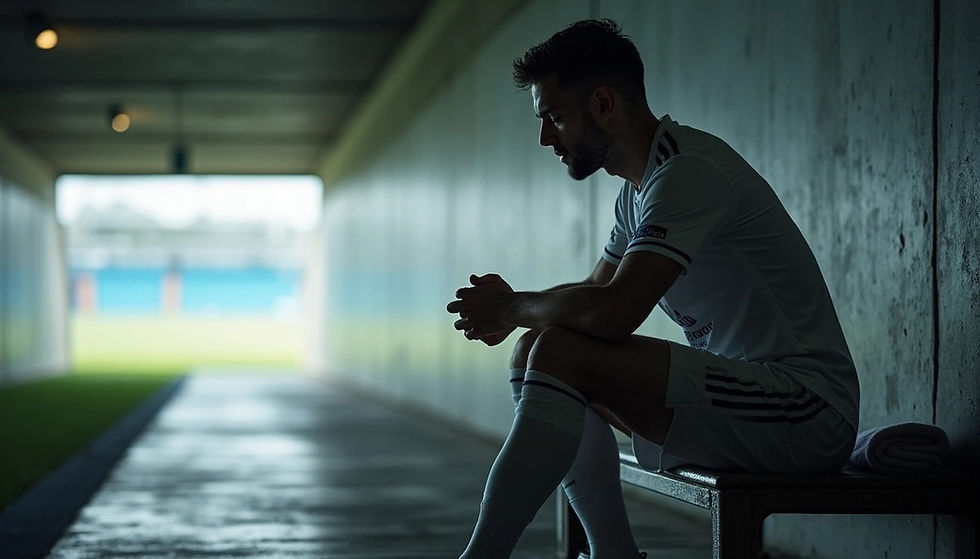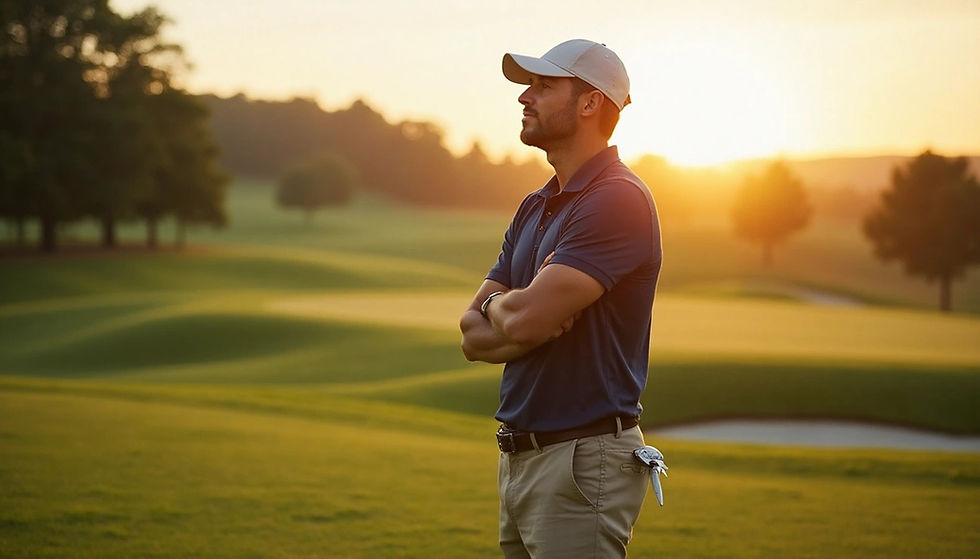How to Help Your Child Beat Sports Performance Anxiety: A Parent's Guide
- Dr Paul McCarthy

- Nov 2, 2025
- 8 min read

Your child might get butterflies in their stomach, break into cold sweats, or feel paralyzed with terror before sports competitions. Sports performance anxiety affects countless young athletes. The symptoms range from rapid heartbeat to negative self-talk before games .
Kids often feel fearful and tense before competitive sports events . This anxiety can grow overwhelming. They struggle to enjoy the experience or perform their best. A racing heart, sweaty palms, and tense muscles can turn an exciting game into a stressful ordeal for young athletes - I've seen this happen many times .
These negative emotions can become too much for some kids to handle. They might quit their sport, sometimes staying away for months . Parents play a vital role in helping children overcome sports anxiety.
The good news is that proven strategies exist to help your child handle their anxiety in sports. Your young athlete might be struggling with performance pressure right now. This piece offers practical ways to support them. We'll cover everything from calming pre-game routines to recognizing signs that professional help might be needed . You'll learn what it takes to help your child beat sports performance anxiety.
What Is Sports Performance Anxiety?
Performance anxiety in sports shows up as intense emotional distress that athletes feel before, during, or after competing [1]. This goes beyond normal pre-game jitters. Sports performance anxiety creates real psychological distress and makes it hard for athletes to perform their best.
Common symptoms in young athletes
Young athletes show three main types of symptoms when dealing with sports anxiety. Somatic symptoms appear as physical reactions such as:
The cognitive symptoms affect how young athletes think. They worry too much, talk negatively to themselves, can't focus, get confused, and feel overwhelming fear of failure [1][2]. Many young athletes believe they're not good enough or won't perform well [3].
The behavioral symptoms are what others can see. Athletes might pace around, fidget, pull away from teammates, avoid eye contact, and sometimes get aggressive by throwing equipment [1][3]. Some kids even pretend to be sick or hurt to avoid playing [4].
How it affects performance and enjoyment
Sports anxiety does more than just make athletes feel bad. It can make them perform much worse than they do during practice [1]. Several things cause this drop in performance.
Athletes can't focus or coordinate well when they're anxious. Their mind fills with worries instead of focusing on the game. This leads to bad decisions and slower reactions [5]. Their tense muscles make it harder to move properly and use their skills.
The most worrying part is how sports anxiety takes the fun out of activities kids used to love. More pressure on children usually means worse performance [5]. Some cases get so bad that athletes lose control of movements they used to do easily [1].
Kids with untreated sports anxiety often quit their sport. They start avoiding practice, make excuses to skip games, or say they want to quit [4][5]. This is a big loss - these young athletes miss out on staying active and all the good things that come from playing sports.
Why Your Child Might Be Struggling
Your child's sports performance anxiety has specific root causes that we need to understand. Every anxious young athlete faces unique challenges that the right approach can help overcome.
Fear of failure and letting others down
Young athletes often freeze up because they worry about making mistakes or disappointing their teammates. Their fear creates a cycle - they focus too much on avoiding errors, become tense and their performance suffers [6]. Kids tend to assume others will judge them harshly for their mistakes [6]. They might even pretend to be sick or injured to avoid potentially embarrassing situations [7].
Perfectionism and unrealistic expectations
Young athletes' perfectionism goes beyond high standards into unrealistic territory [8]. The problem has reached near public health crisis levels, with almost 40% of children showing perfectionist tendencies [8]. These kids show warning signs like extreme reactions to mistakes, quick surrender, or complete meltdowns when things aren't perfect [8]. This mindset develops in part because athletes focus only on outcomes instead of improving [9].
External pressure from coaches or parents
Research shows a key difference between what kids and parents value in sports. Kids play mostly to have fun, but parents often think winning drives their children [10]. This mismatch creates too much stress for young athletes [10]. Kids often doubt their abilities and self-worth when parents set unrealistic goals or show disappointment [11]. About 30% of youth quit sports because of negative actions from coaches and parents [10].
Lack of preparation or confidence
Anxiety sometimes comes from real concerns about physical readiness. Kids who feel physically unprepared - whether they're slow, weak, or out of shape - hesitate to act during games [12]. You'll notice confidence issues when kids avoid risks, play better in practice than matches, give up after mistakes, or show closed body language [12]. These confidence problems don't indicate laziness but usually point to a fragile self-image [12].
8 Ways to Help Your Child Overcome Sports Anxiety
Your child needs practical strategies to build mental resilience when dealing with sports performance anxiety. Here are eight ways to help your young athlete handle competitive pressure better.
1. Normalize their feelings and talk openly
Kids need to know that anxiety before big games is natural, which helps reduce their nervousness [13]. The sort of thing I love is explaining "butterflies" in the stomach to younger children [13]. Your child's performance improves when you acknowledge and normalize these feelings [2]. Watch their behavior, ask questions, and listen with genuine interest to understand what they're going through [14].
2. Create a calming pre-game routine
A consistent routine before competitions gives your child more control and reduces anxiety [2]. They should arrive early to get familiar with surroundings, warm up properly, and stay relaxed [4]. The routine might include light stretching, calming music, or quiet time [2].
3. Teach simple breathing techniques
Breathing exercises help kids re-center when nerves kick in [13]. Box breathing activates the body's natural calming system - inhale for 4 counts, hold for 4, exhale for 4, hold for 4 [15]. Kids also respond well to 5-finger breathing, tracing their hand while breathing, and deep belly breathing that loosens tight muscles [15].
4. Use visualization to build confidence
Daily visualization of success builds belief and creates positive mental images [16]. Athletes feel ready for pressure moments with this powerful technique [16]. Your child should use all senses—seeing, hearing, and feeling the experience [16]. The technique works best when practiced daily and matches your child's learning style [17].
5. Focus on effort, not just results
Your child feels less pressure when they focus on the process rather than outcomes [2]. Highlight what went well during competitions to boost their confidence [13]. Success in sports changes with circumstances—it shows up in reaching specific goals, getting recognition, and growing as a person [1].
6. Help them set realistic goals
Your child needs goals that are "Achievable, Believable, and Commit-able" [5]. Small action steps make big objectives feel possible [5]. Start with simple wins—success breeds motivation [5]. Work with them to spot potential roadblocks and plan ways around them [18].
7. Encourage positive self-talk
Positive self-talk boosts physical performance by 11% [19]. Your child can learn four types: calming ("Take a deep breath"), instructional ("Bend your knees"), motivational ("I can do this!"), and focus-oriented ("Stay present") [19]. Using their name or "you" works better than "I" statements [19].
8. Support their overall well-being
Mental training matters as much as physical practice—sports success is 70% to 80% mental [20]. Good sleep, nutrition, and hydration make a big difference [4]. Mindfulness practices help reduce anxiety and depression in teens [20]. Most importantly, create an environment where your child feels valued no matter the game's outcome [2].
When to Seek Professional Support
Parents need to watch their children carefully to spot the difference between normal pre-game jitters and deeper anxiety problems.
Signs that anxiety is becoming a bigger problem
Your child's sports anxiety might have grown beyond typical nervousness. Look out for these warning signs:
Your child might need professional help if these symptoms keep showing up throughout the season or during high-pressure competitions [13].
How a sports psychologist can help
Sports psychologists offer mental support that fits young athletes' specific needs. These experts will:
Build mental and coping skills that help children perform well whatever the competitive pressure [24]
Show them visualization, stress management, and confidence-building methods [3]
Help them stay focused without getting distracted internally or externally [3]
Develop psychological skills that help not just in sports but also in school and life [24]
Sports psychology doesn't just fix problems—it helps build mental strength over time [23]. These professionals create a safe space where young athletes can talk about their performance feelings and develop better views toward competition.
Conclusion
Sports performance anxiety can turn a joyful experience into a stressful ordeal for young athletes. Children's anxiety demonstrates itself physically, mentally, and behaviorally. This affects both their performance and enjoyment on the field.
Parents play a vital role in helping their child handle these challenges. The strategies outlined above—from normalizing feelings and teaching breathing techniques to encouraging positive self-talk—are practical tools you can use right away. These approaches build resilience that extends beyond sports while addressing anxiety.
Your child needs an environment where they feel supported whatever the competitive outcomes. Children do well when they understand their worth isn't tied only to athletic accomplishments. The ultimate goal should be to promote a healthy relationship with sports that lasts a lifetime.
Professional guidance becomes necessary sometimes despite your best efforts. Watch for warning signs that point to deeper issues, such as persistent physical complaints or sudden loss of interest in previously loved activities. A sports psychologist can provide specialized support to complement your efforts at home.
Youth sports offer incredible opportunities for growth, friendship, and character development. Performance anxiety might temporarily cloud these benefits, but the right support system can help your child find joy in playing again. These strategies will help you and your young athlete tackle anxiety together, so they can perform confidently while enjoying the game once more.
Key Takeaways
Sports performance anxiety affects countless young athletes, but with the right parental support and strategies, children can overcome these challenges and rediscover their love for the game.
• Normalize anxiety feelings - Help your child understand that pre-game nerves are completely normal and experienced by most athletes
• Create consistent pre-game routines - Establish calming rituals like breathing exercises, visualization, and proper warm-ups to build confidence
• Focus on effort over results - Praise your child's hard work and improvement rather than just wins to reduce performance pressure
• Teach practical coping skills - Simple techniques like box breathing, positive self-talk, and visualization can significantly reduce anxiety symptoms
• Watch for warning signs - Seek professional help if anxiety causes persistent physical complaints, sleep issues, or loss of interest in sports
• Support overall well-being - Remember that mental health training is as important as physical preparation, requiring adequate sleep, nutrition, and emotional support
The key is creating an environment where your child feels valued regardless of competitive outcomes, helping them build lifelong resilience that extends far beyond sports.
References
[1] - https://pmc.ncbi.nlm.nih.gov/articles/PMC10376742/[2] - https://foxesclub.com/strategies-to-help-your-child-overcome-performance-anxiety-in-sports/[3] - https://www.toptierlessons.com/blog/68614d7d9714404f33a28b03-should-my-child-see-a-sports-psychologist?[4] - https://www.nationwidechildrens.org/family-resources-education/700childrens/2019/09/sports-performance-anxiety[5] - https://truesport.org/goal-setting/create-strong-habits-help-athletes-achieve-goals/[6] - https://www.peaksports.com/sports-psychology-blog/sports-psychology-athletes-fear-of-failure/[7] - https://www.successstartswithin.com/sports-psychology-articles/sports-psychology-for-kids/helping-young-athletes-manage-fear-of-failure/[8] - https://changingthegameproject.com/parenting-coaching-perfectionist-athlete/[9] - https://truesport.org/performance-anxiety/tips-athletes-avoid-perfectionism/[10] - https://pmc.ncbi.nlm.nih.gov/articles/PMC3871410/[11] - https://cdn.bcm.edu/news/unruly-sports-parents-effect-on-childrens-mental-health[12] - https://theathleteacademy.uk/performance-in-youth-sports/[13] - https://www.hopkinsmedicine.org/health/wellness-and-prevention/5-tips-for-overcoming-sports-performance-anxiety-in-student-athletes[14] - https://www.hopkinsmedicine.org/health/wellness-and-prevention/student-athlete-mental-health[15] - https://positivecoach.org/resource-zone/breathing-exercises-for-athletes/[16] - https://www.youthsportspsychology.com/youth_sports_psychology_blog/the-power-of-pregame-visualization/[17] - https://www.kidssportspsychology.com/improve-sports-kids-confidence-and-focus/[18] - https://www.tandfonline.com/doi/full/10.1080/10413200.2023.2185699[19] - https://www.coachestoolbox.net/mental-toughness/positive-self-talk-for-your-athletes[20] - https://pmc.ncbi.nlm.nih.gov/articles/PMC10916786/[21] - https://www.drpaulmccarthy.com/post/child-sport-psychology-a-complete-guide-to-helping-young-athletes-thrive[22] - https://www.texaschildrens.org/content/wellness/managing-sports-anxiety-children[23] - https://www.papsychotherapy.org/blog/when-to-choose-a-sports-psychologist-for-performance-support[24] - https://www.thinkbelieveperform.co.uk/sport-psychology-for-young-athletes/








